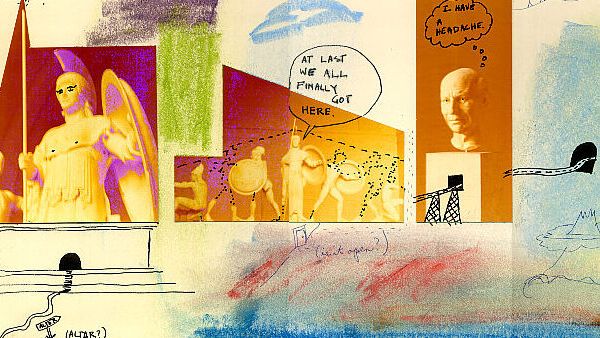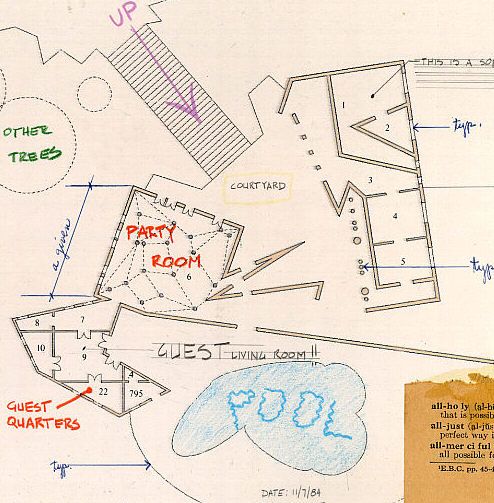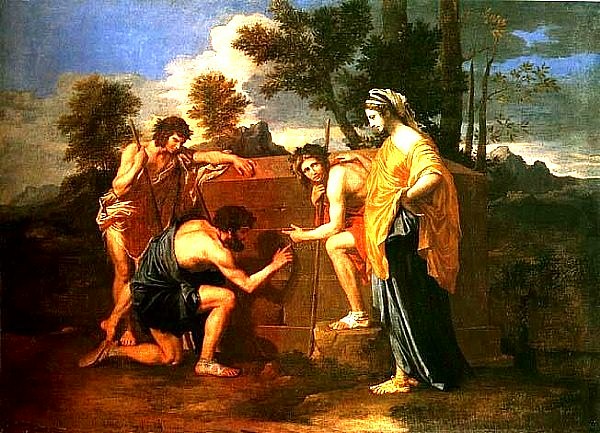| |

Home Depot Home Kit?
...as a piece of literature. I could attempt to "reveal eternal meaning by opening dialogue between particular historical persons or events and which thus assign prophetic force to its self-referentiality." Or I could also consciously "authorize a positive reading of discourse by negating a previous negative reading."
"...enactment of interplay between secrecy and revelation, innovation and tradition."
"...revelations that history is language. Their signing is essentially counter signing, authenticating a textual - verbal or visual - shaping of experience by adding and inviting us to add other, often contrary signatures to it."
| |

Design for the Eisenhower Memorial from exactly 29 years ago
There was also a modern studio...

...a readable narrative of Ancient Rome's political and architectural history--but in order to grasp this delineated 'text' one must 'read' in unison the individual plans, the plans in relationship to each other, the plans in relation to where the actual buildings really were, and (this is perhaps the most important) the Latin labels Piranesi gives to each plan.
When I proposed Michelangelo as a place to look for the 'beginnings' [Alex's original rhetorical only asked about who 'designed'], I also particularly called out Michelangelo's fortification designs for Florence. In the almost two weeks since then I did some further reading/research on the fortifications. I read what Ackerman and Argan/Contradi offer, and I was surprised to learn that fortifications by Michelangelo were indeed executed, but in an impermanent fashion--packed dirt and straw--and did not stand up well to attack. Their only record today are Michelangelo's design sketches. Also surprising were the dates of the designs: 1528-29, i.e., before Michelangelo's mature [architectural] works in Rome. I was surprised because of the relative earliness within the 16th century--"is it possible that there were Baroque 'beginnings' so early in the 16th century?"
I then looked through The Timetables of History, a reference book that chronologically lists events year by year. There I found that the Sack of Rome occurred in 1527 and is "referred to as 'End of the Renaissance'." Now I was very intrigued by what was going on politically and socially in Italy at that time, and did further reading throughout Encyclopedia Britannica. For example, the Marxist view of the end of the Renaissance calls out Luther's "protests" of 1517. In any case, very unstable times for the Roman Catholic Church, 'the' Establishment.

It says, "History is both a collective and an individual collection of occurrences, especially in terms of design."
| |
I like what you say about not recalling "another film that, structurally, collages space and time in that particular way." Two for the Road does indeed collage space and time, but I was never sure how unique its particular method of cinematically doing so might be. In any case, it's worth noting that the collage here very effectively relates a narrative, specifically a 'modern' life narrative. Is the film's "collage of space and time" a (romantic) reflection (i.e., mirror) of modern life itself?
Could it be that the age old narrative journey motif's (Homeric epic) modern replacement is the narrative 'vehicle' motif ?
Paul wrote:
How does evolution work? My understanding is that it requires a mutant, an individual who diverges from the norm, who may adapt more advantageously to conditions and producing progeny with new characteristics. This is evolutionary change. The system doesn't mutate. It is INDIVIDUALS who are mutants.

School of Intemperate Cantileverage
Steve adds:
This is very interesting, and I like the conciseness. Germane to the ('beginnings' of) the Baroque, it makes me think of Martin Luther as very much a mutant/mutinous Roman Catholic. Besides his 95 theses, Luther also thereafter translated the New Testament and then the Old Testament into German for the first time--the Bible linguistically mutated, if you will.
|




